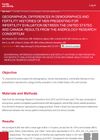Is Age More Than Just a Number? Characteristics of Men Presenting for Reproductive Urology Fertility Evaluation in North America Stratified by Age Groups
September 2021
in “
Fertility and Sterility
”

TLDR Older men have different fertility histories and factors affecting fertility, suggesting they may benefit from earlier fertility evaluations.
The study surveyed 5100 men from 22 North American reproductive urology practices to evaluate the effects of male age on demographics, clinical characteristics, and fertility histories. The average age of men was 36.7 years and the average partner’s age was 33.2 years. The study found that obesity was most common in men aged 41-45 years (37.6%). Increasing age correlated with longer duration of infertility, with men aged 46-50 years having a mean duration of infertility of 5.4 years. Younger men (age <40) were more likely to be referred by a reproductive endocrinologist, while self-referrals and primary care physician referrals increased in older men. The proportion of vasectomized men increased with age. Rates of assisted reproductive technology use varied between age groups. Alcohol, marijuana, and cocaine use were most common in younger men, while finasteride, steroid, and testosterone use were most common in men >50 years. The study concluded that males of different ages had different fertility histories and different modifiable factors, suggesting that older males may benefit from earlier male fertility evaluation.



